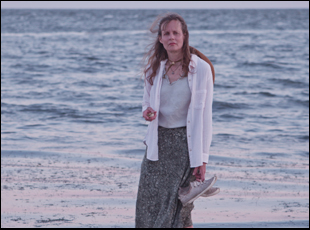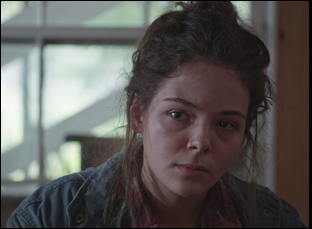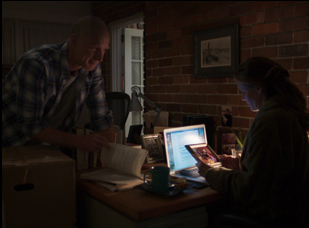Throughout the making of “Rachel Hendrix,” but particularly now when he’s about to let go of it, Victor Nunez was reminded of something his friend and colleague Gil Dennis once told him about a script he was working on. Nunez’s films are often so rich in detail that they feel like stepping into another world, even though the likes of “Ruby in Paradise,” “Ulee’s Gold” and “Coastlines” are the exact opposite of a foreign experience in revealing the depth of the person next to us, no matter what their walk of life, and for the writer/director, it can seem all-consuming for the years he puts into them. He apologizes now for potentially being too much in this creative bubble when we last spoke a few months ago – I assure him he was entirely cogent and eloquent – but Dennis’ words nonetheless held significant meaning in the case of “Rachel Hendrix” when telling of a creative writing professor still struggling to get over the grief of losing her husband a year earlier.
“Gil, a wonderful writer and a mentor at AFI for years and years [told me], “Victor, if you’re lucky, life reclaims you,” said Nunez. “And ‘Rachel’ got lucky.”
Nunez finds himself in a similar situation as his character funnily enough for reasons that have little to do at all with the autobiographical elements of the drama, which draws on his own experience as a widower and an educator. However, after constructing a cocoon in which he could channel his own feelings of frustration and loss, he is once again grappling with the question that he asks of Rachel, “how do you find a place back in the world?” The filmmaker’s search for answers is as provocative, complex and heartfelt as you might expect when Rachel (Lori Singer) suffers through the malaise of going through the motions in a job where she’s called on to be an inspiration to others, molding young minds while she fails to have control over her own thoughts. Her beach house remains haunted by her husband (Hugo Armstrong), with memories making him tangible even if she can’t actually hold onto him again, and enough time has passed that she can start letting others in, including her daughter Susan (Kersti Bryan), her friend Em (Catherine Dent) and her daughter Ann (Kim Sandwich), who she can help by throwing a few bucks her way to clean up the place.
Poignantly making the pandemic it was filmed in a part of the story, “Rachel Hendrix” illuminates how a traumatic event can expose a lot of preexisting tensions as Rachel wonders if grief is throwing her off and her perception could also be shaped by factors she could be far less aware of in a community where disparities in wealth and education may never cross her mind with her main exposure to a younger generation coming from the students who can afford the cost of college. When words begin to fail her, a precarious position for a writer, changing the narrative seems impossible, yet “Rachel Hendrix” watches its titular character rebuild her vocabulary as her sense of purpose comes from her place in other people’s lives.
The magnificent character study is making its premiere at the Santa Barbara Film Festival this weekend and Nunez graciously spared a few minutes to talk about the film, its connections to his 1993 breakthrough “Ruby” which gave Ashley Judd as juicy a role as Singer has in “Rachel Hendrix,” and realizing that instead of running away from the pandemic as a plot point, he could find meaning in it.

I taught in the fall of 2020 when Zooming was the way of all worlds back then and of course, it features in the film, so here it is. It seems appropriate and we actually got the rights. We wrote Zoom to get permission and they said, “Of course,” but we felt like we better just ask, just in case.
It’s such a lovely film and I feel one of the first to so acutely convey the generational divides and social issues that have been exacerbated by the pandemic. Was this in the works before the pandemic or was that foundational for you?
I’ve been working on this film for six years, so it existed [before]. In fact, when I went off the summer after all of this stuff happened, I felt well, it was a catharsis to deal with in the writing, but I figured it was done [for] because it felt like the pandemic was just going to take over everything. Then sitting and watching the sun go down, I suddenly realized actually, this is the perfect context for this story because it focuses this strange bond or contradiction or reality that you live with between the private world focused on grief and the other world that has huge issues in which one individual means nothing in one sense and of course, if the individual doesn’t mean nothing then none of us mean anything. The minute that little light bulb went off, it became what it is.
There’s a scene where Rachel and Ann are able to see each other clearly for the first time as people – they’re no longer employer/employee or a family friend – after Rachel finds Ann’s been sleeping at the beach house, and the conversation that happens so elegantly conveys how Rachel thinks about the younger generation, only exposed to the bright young things in her (virtual) classroom, and how it’s very different than the world that Ann inhabits. Was that a difficult thing to illustrate?
That had always been in the film and again, it meant more in the context of COVID. I think the two actors – Lori [Singer] and Kim Sandwich just knock it out of the park, but it was written three years ago and it’s about this challenge that everybody always has [of] how are generations linked? Usually, in a movie if it’s about young people, the old people are fools and then if it’s about young people, the old people are fools. What struck me is we’re all on this same journey, just in different stages and the assumption of education and of school is that since the middle ages or before, there’s something that can be shared/passed on and there’s also a kind of resilience or reminder of a certain vitality that you can remember and reengage.
Where it was accidental was Derrida and the concept of hospitality [that is part of Rachel’s course teaching], but that was just a really happy connection because his whole thing is hospitality is not something that you give to a friend. Hospitality is something that you extend. So I think it’s a wonderful scene [too], but I don’t take any credit because they both just got it.
I think you probably should. When you allude to the fact this grew out of your own academic experience, how did this take shape as a story?
First off, this is sort of a part two of our conversation about “Ruby” because at the time when “Ruby” was made, nobody wanted a movie about a young shop girl in a nowhere place coastal town. That’s not an exaggeration. And now it’s like no one seems to be interested in treating people over 60 years like they’re real people when they’re still very much in the throes of living, so I jokingly called it “My Old Ruby.” And there is a connection in terms of centering it about one woman going through a certain stage in life and a set of circumstances, but then I could say, that’s what all the movies are, how does someone try to find their way in the world in the sense of an identity. Ben Lanier, the beekeeper that we filmed “Ulee’s Gold” [with] — he’s wonderful and he loves to claim that he’s an old rowdy reactionary redneck, but at the end of the day, he said, “You know, all you really want to do is be a good person.” and I think that’s actually a pretty good way to say it. In its own way, both Ruby and Rachel are trying to figure out in their own way how to be a good person in a very confused world.
And it wasn’t so much about the teaching. I started writing this about seven or eight months after my wife died and that was seven years ago, and for a couple years, I just said, “Well, at least writing this thing is going to keep me sane.” As it happens, I knew something or felt I did from teaching film for about eight years that the context of what does this person do lent itself [to this character]. There’s a reason why Rachel isn’t Richard and why she’s not a film teacher, but a creative writing teacher because I feel there’s an interesting opportunity if you leave the mirror phase or the entire autobiographical point and try to create and find a set of characters to take on their own being and identity and world.

I met with her once very, very briefly about five years before we filmed and it was a nice conversation because of two friends of hers that I knew, and at the time, she was just too young. So I joked with Lori when we were in the thick of it, “Lori, I had to put up with five years of waiting and having everybody say no, so that you’d be old enough to be able to play this part.” [laughs] And with Lori, I was scheduled to fly into New York to meet her the day before they shut New York down [due to the COVID outbreak], so I cancelled the flight and for a year, we were communicating in this other way [over Zoom], but she came knowing that script backwards and forwards and if there’s enough in a script and the actor takes ownership, then your job is just to adjust the rudder a little bit here and there, but basically hang on. What I felt Lori brought was just this life and this absolute credibility that this is someone going through this thing.
Another parallel I thought with “Ruby” is how tender the voiceover is – it’s not used for narration, but organizing thoughts in Rachel’s mind. What’s that process like with the actor?
“Ruby,” it starts much earlier and she keeps a journal and what fascinated me was Rachel is a writer and she’s not really been writing, so she does it in fits and starts. The introduction of the voiceover so much later in the film concerned me a little bit and I feel pretty good [now] about the way it unfolds, but it goes through layers. We recorded those lines as the last thing before the film was edited and the biggest and most interesting challenge there were those last words. There was a temptation from folks, “Oh you don’t need words there.” But I just knew that we needed the sound of Rachel’s voice as closure and we needed something said there. But again, I credit the actors. We had a room where it was quiet enough and Lori didn’t have to shout.
The supernatural element of this is handled so simply and elegantly as well. Was that tricky to figure out?
At the very beginning, this all started with somebody arrives at the house and those two events that happen were there and I knew they weren’t dreams. I didn’t know what they were. It took about two years and I went to some production company that was very interested for a while, and [as I was talking to them, I realized] I made a ghost story. It was an unconscious thing, and once I understood it, I always say to the students, if you’re going to make a ghost story, you have to understand the rules in your story. The ghosts were not really even necessarily aware that they were present to the person. They haunted the person and they were basically driven by dreams. I think it is true when you’ve known someone for a very long time, they are present in one way or the other… so do you think the ghost story worked?

That happened to me, and that’s probably why the dreams are there because that was as close as I could come to showing the actual experience of that dream. I have to say, though, it was Lori who understood that the pain would happen in the telling of it. When she did that, I thought, “My God, what’s Lori doing?” But I’m smart enough to know when to leave the camera on and it’s not just the dream, but the aftermath of the dream that makes that [scene] work so nicely.
E.M. Forster said, “We know people better in a novel than we could possibly know them in life,” and I realized that’s part of why we read novels and why we tell stories. Somehow when it is all working, they all feed off each other – your life and what you read or the movies that you see that have this quality, they work. My goal is that if you can walk out of a theater feeling better about being alive than when you came in, you’ve done the job and hopefully it’s been entertaining in that process.
“Rachel Hendrix” will screen at the Santa Barbara International Film Festival on February 11th at the Fiesta 5 Theatre at 4:20 pm and February 13th at 11:20 am at Metro 4 Theatre.




